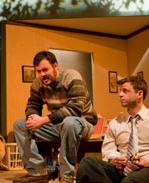SITE GUIDE
SEARCH
REVIEWS
REVIEW ARCHIVES
ADVERTISING AT CURTAINUP
FEATURES
NEWS
Etcetera and
Short Term Listings
LISTINGS
Broadway
Off-Broadway
NYC Restaurants
BOOKS and CDs
OTHER PLACES
Berkshires
London
California
New Jersey
DC
Philadelphia
Elsewhere
QUOTES
TKTS
PLAYWRIGHTS' ALBUMS
LETTERS TO EDITOR
FILM
LINKS
MISCELLANEOUS
Free Updates
Masthead
Writing for Us
A CurtainUp Review
The Main(e) Play
|
How many times you got to get bit by
the same dog before you stop petting it?
.— Shane
|

Michael Gladis and Alexander Alioto
in The Main(e) Play
(Photo: Ryan Jensen ) |
In fact, there's much that leaves one guessing. The opening scenes are short, with clipped, cryptic dialogue so filled with obscenities and locker room humor it's hard to discern the meaning behind the dirty words and guffaws. But after a while a plot, of sorts, does emerge.
Shane (Alexander Alioto) is a New York City actor. His less than sophisticated brother Roy (Michael Gladis) lives in the house they grew up in with his troubled son (Shane calls him a "seven-year-old terror," and that's not the worst). He's a single dad because the boy's mother, a woman named Amy, disappeared some time before The Main(e) Play begins and has no real role in Roy's life or the play.
For many years Shane was involved with Jess (Susan Dahl), a woman who might have had his child if she hadn't had an abortion. At the time of Shane's return she is dating a local named Rooster (Curran Connor), a hard-drinking, loud-mouthed kind of guy who really should have been Roy's brother instead of Shane. Nevertheless, there's a little (predictable) side action between the two of them
One day while Roy is out and Shane is babysitting, Roy's son shoots his dozing uncle with a BB gun. A girl scout (Allyson Morgan) comes to collect money for cookies she has sold to Roy. While looking for money to pay her, Shane discovers that his wallet is missing. He suspects the miscreant child. When the boy refuses to stop playing his drums while Shane is talking to his agent over the phone, Shane has a fit, threatens the child and breaks his drum. This does not go over well with brother Roy.
Roy and Shane's mother has taken off with a black man named Maurice. There's a great deal of talk about her, but she never appears.
The main (no pun intended) problem with this play, however is not the tired plot that even consistently fine acting cannot redeem, but the director and playwright's decision to keep all of the action offstage: Shane's confrontation with Rooster at a restaurant, Shane's outburst with Roy's son, the family Thanksgiving dinner with Roy and Shane's mother. The play is all Monday-morning quarterbacking and no game.
During the last fifteen minutes, Beckim makes a hasty and much belated attempt to tie his work together. Previously withheld information is given, old grudges are reviewed, feelings are revealed. But by this time anyone who is looking for anything more than how many ways to use the four-letter word may have lost interest.
The Main(e) Play is basically a family drama, not much different from the kind of plays that made Tennessee Williams or Eugene O'Neill's reputations. But those writers knew how to show emotion and conflict without resorting to incessant cursing and the knowing nod to cute and current slang like "LOL" and "whatever."
There probably is a story someplace beneath the debris of this play. It would take a lot of work to find it.
Editor's Note: Two years ago, Nami, a much more satisfying play by Beckim had a run in another Theatre Row theater. Julia Furay reviewed it and I also saw and liked it. To read that reviewgo here
|
THE MAIN(E) PLAY By Chad Beckim Directed by Robert O'Hara Cast: Alexander Alioto (Shane), Curran Connor (Rooster), Susan Dahl (Jess), Michael Gladis (Roy), Allyson Morgan (Girl Scout) Set Design: Caleb Levengood Costume Design: Whitney Locher Lighting Design: Jason Jeunnette Sound Design: Daniel Odham Running Time: 85 minutes Presented by Partial Comfort Productions, The Lion Theater Theatre Row Studios 410 West 42nd Street (212) 279-4200 From 1/16/08; opening 1/23/08; closing 2/9/08 Wed — Sat. at 8pm Tickets: $18 Reviewed by Paulanne Simmons Jan. 23, 2008 |
Try onlineseats.com for great seats to
Wicked
Jersey Boys
The Little Mermaid
Lion King
Shrek The Musical

The Playbill Broadway YearBook

Leonard Maltin's 2007 Movie Guide


Wicked
Jersey Boys
The Little Mermaid
Lion King
Shrek The Musical

The Playbill Broadway YearBook

Leonard Maltin's 2007 Movie Guide


